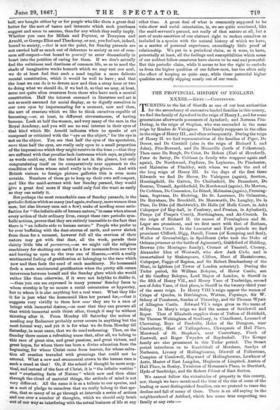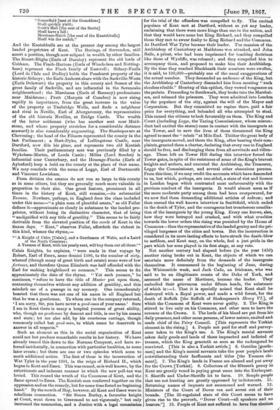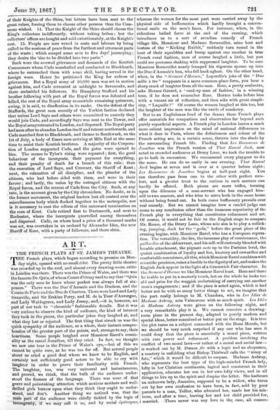THE PROVINCIAL HISTORY OF ENGLAND.
—C omits nen.
Huntingfield, De Gatten, Be Challesfield, De Bramshott, De Bourne, Trussell, Apelderfield, Be Northwood (again), De Morton, De Cobham, De Consenton, Le Bland, Molmaina (again), Fremiug- ham, Septvans, De Shelving, De St. Laurence, De Orlanston, De Reynham, De Brookhill, De Mereworth, De Langley, Be in Pine, Be Dike (of Sheldwick), De Hells (of Hells Court, in Ash)
Colepeper (of Bay-hall, in Pembury, and Preston, in Aylesford), Pimpe (of Pimpe's Court), Northingham, and At-Crouch. In the reign of Richard II. the names of Fremingham and St. Leger are prominent, and we first meet with that of Berham, of Bedlam Court. In the Lancaster and York periods we find prominent Clifford, Digg, Darell, Fienes (of Kempsiug and Seal), Waller of Groombridge, in Speldhurst (who took the Duke of Orleans prisoner at the battle of Agincourt), Guideford of Halding, Browne (the Montague family), Cromer of Tarlatan, Cheney, Alexander Idea of Westwell, who slew Jack Cade, and is immortalized by Shakespeare, Clifton, Haut of Hautsbourne, Colepeper, Fogge of Reptou, and Sir Robert Brackenbury of the Moat, in Ighthan (of Tower of London notoriety). During the Tudor period, Sir William Boleyne, of Hever Castle, son of Sir Geoffrey Boleyne, Lord Mayor of London, is Sheriff in the fifth of Henry VU., and Henry Vane of Tunbridge, second son of John Vane, of that place, is Sheriff in the twenty-third year of the same reign. In Henry VILL's reign appear the names of Crispe of Quedes, in Birchingtou, Wotton, Poynings, Sir W. Sidney of Penshurst, Sondes of Throwley, and Sir Thomas Wyatt of Allington Castle. Edward VL's reign gives us the name of Sidley. In Mary's reign we find the names of Southwell and Roper. That of Elizabeth supplies those of Tuft= of Hothfield, Sir Thomas Walsingham of Scadbury, in Chiselhurst, Lennard of Chevening, Boys of Fredville, Hales of the Dungeon, near Canterbury, Hart of Tullingsbone, Champneis of Hall Place, Manwood of St. Stephen's, near Canterbury, Finch of Eastwell, and Roger Twysden of Roydenhall. The Kempe family are also prominent in this Tudor period. The Stuart period introduces us to Knatchbull of Mersham, Sandys of Nerbourn, Livesey of Hollingbourne, Dixwell of Folkestone, Campion of Combwell, Hayward of liollingbourne, Lewknor of Acris, Master of East Langdon, Hugisson of Lingsted, Austen of Hall Place, in Bexley, Twisleton of Reunion's Place, in Dartford, Hyde of Sandridge, and Sir Robert Filrner of East Sutton.
We cannot follow the vicissitudes of property in this county, nor, though we have mentioned the time of the rise of some of the leading or most distinguished families, can we pretend to trace the decline and fall of many of them. There is an old saying in the neighbourhood of Ashford, which has come true respecting one family at any rate :—
"Somertleld [seat of the Gomeldons] Shall quickly yield; Scott's Hall [the seat of the Scotts] Shall have a fall ; Mersham-Hatch [the seat of the Knatchbulls]
Shall *in the match."
And the Knatohbulls are at the present day among the largest landed proprietors of Kent. The Dering,s, of Sarrenden, still assert a position, though now eclipsed in wealth by other families. The Stuart-Blighs (Earls of Darnley) represent the old lords of Cobham. The Finch-liattons (Earls of Winchelsea and Notting- ham) represent the Finch family of Eastwell ; Sidney-Foulis (Lord de l'Iale and Dudley) holds the Penshurst property of the historic Sidneys ; the Earls Amherst share with the Saekville-Wests (Earls Delawarr) the property in this county and Sussex of the great family of Sackville, and are influential in the Sevenoaks neighbourhood ; the Marshams (Earls of Romney) predominate near Maidstone ; Pratt (Marquis of Camden) is now rising rapidly in importance, from the great increase in the value of the property at Timbridge Wells, and finds a neighbour and rival in Neville, Earl of Abergavenny, the representative of the old historic Nevilles, at Eridge Castle. The wealth of the latter nobleman (who has another seat near Maid- stone, and whose property stretches for a considerable distance seaward) is also considerably augmenting. The Stanhopes are at Chevening ; the head of the Filmers represented the county in the last Parliament ; a Hart-Dyke, of Lullingstone Castle, near Dartford, now fills his place, and represents two old Kentish families. Their parliamentary seat was previously filled by a Wykeham-Martin, of Leeds Castle ; Miles (Lord Sondes) is influential near Canterbury, and the Heneage-Fincla (Earls of Aylesford) keep a hold on the county at the place of that name.
We may conclude with the name of Legge, Earl of Dartmouth and Viscount Lewisham.
From division the estates do not run so large in this county as in some others, but they are generally much more valuable in
proportion to their size. One great feature, prominent in all times in the history of Kent, still remains,—its substantial Yeoman. Nowhere, perhaps, in England does the class included under this name—" a plain man of plentiful estate," as old Fuller defines it—approximate so closely in substance to the landed pro- prietor, without losing its distinctive character, that of being "undignified with any title of gentility." This seems to be fairly
derivable from the elevated position of the ceorla of Kent in the Saxon days. "Kent," observes Fil1er, affordeth the richest in
this kind, whence the rhyme,—
" ' A Knight of Calds [Calais], and a Gentleman of Wales, and a Laird of the North Countree ;
A Yeoman of Kent, with his yearly rent, will buy them out all three."
Calais Knights, he explains, "were made in that voyage by Robert, Earl of Essex, anno domini 1596, to the number of sixty, whereof (though many of great birth and estate) some were of low fortunes, and therefore Queen Elizabeth was half offended with the Earl for making knighthood so common." This seems to fix approximately the date of the rhyme. "Yet such yeomen," he continues, "refuse to have the title of Master put upon them, contenting themselves without any addition of gentility, and this mindeth me of a passage in my memory. One immoderately boasted that there was not one of his name in all England but • that he was a gentleman. To whom one in the company returned,
I am sorry, Sir, you have never a good-man of your name.' Sure I am in Kent there is many a hospital yeoman of great ability, who, though no gentleman by descent and title, is one by his means
and state ; let me also add, by his courteous carriage, though commonly called but good-man, to which name he deaerveth to answer in all respects."
Such an element as this in the social organization of Kent could not but produce remarkable results in her history. We have already traced this down to the Norman Conquest, and have re- ferred incidentally, in connection with particular localities, to some later events ; but there are one or two episodes which seem to merit additional notice. The first of these is the insurrection of Wat Tyler in the year 1381, in the reign of Richard II., which began in Kent and Essex. This was caused, as is well known, by the extortionate and indecent manner in which the new poll-tax was levied. This roused the wrath of the Commons of Kent, and the flame spread to Essex. The Kentish men conferred together on the oppression and on the remedy, but for some time found no beginning hand." By the month of May, however, all Kent and Essex were in rebellious commotion. "Sir Simon Burley, a favourite knight at Court, went down to Gravesend to act vigorously," but only increased the commotion, and a Justice with a legal commission for the trial of the offenders was compelled to fly. The excited populace of Kent met at Dartford, without as yet any leader, exclaiming that there were more kings than one in the nation, and that they would have none but King Richard, and they compelled those they met to swear fealty to King Richard and the Commons. At Dartford Wat Tyler became their leader. The mansion of the Archbishop of Canterbury at Maidstone was attacked, and John Belle, a priest, who had been imprisoned for teaching doctrines like those of Wycliffe, was released ; and they compelled him to accompany them, and proposed to make him their Archbishop. By the time they reached Blackheath their numbers were swollen, it is said, to 100,000—probably one of the usual exaggerations of the actual number. They demanded an audience of the King, but the Archbishop of Canterbury dissuaded him from meeting "such shoeless ribalds." Hearing of this epithet, they vowed vengeance on the prelate. Proceeding to Southwark, they broke into the Marshal- sea, and released the prisoners. They were admitted into London by the populace of the city, against the will of the Mayor and Corporation. But they committed no rapine there, paid a fair price for everything, and beheaded all who attempted to steal. This caused the citizens to look favourably on them. The King and Court (including Legge, the Taxing Commissioner, whose miscon- duct had excited the storm) came in contact with the insurgents at the Tower, and to save the lives of those threatened the King agreed to meet the " rebels "at Mile End. Thither the great body of the insurgents moved, and there the King, after hearing their com- plaints, granted them a charter, declaring that every one in England should be free, and discharging them from all servitude and villen- age. Those left on Tower Hill during this interview forced the Tower gates, in spite of the resistance of some of the King's bravest knights and archers, and executed the Archbishop, the Treasurer, Legge the Commissioner, and several other obnoxious persons. From this time, if we may credit the accounts which have descended to us, but which, perhaps, are one-sided, a state of riot and licence in London began which contrasted most unfavourably with the previous conduct of the insurgents. It would almost seem as if the more moderate party among them had been overpowered, for- we now find them demanding additional articles of redress ; and then ensued the well known interview in Smithfield, which ended in the death of Tyler, and the courageous but treacherous concilia- tion of the insurgents by the young King. Every one knows, also, how they were betrayed and crushed, and with what cruelties towards the lower orders this rising was punished by the House of Commons —then the representative of the landed gentry and the pri- vileged burgesses of the cities and towns. But the insurrection is considered in its more lasting effects to have struck the death-blow to serfdom, and Kent may, on the whole, feel a just pride in the part which her sons played in its first stage, at any rate.
Not another century had elapsed before (in the year 1450) another rising broke out in Kent, the objects of which we can ascertain more definitely from the demands of the insurgents. themselves. It commenced in the beginning of June, during the Whitsuntide week, and Jack Cade, an Irishman, who was said to be an illegitimate cousin of the Duke of York, and assumed the name of Mortimer, became the leader. They embodied their grievances under fifteen heads, the substance of which is :-1. That it is specially noised that Kent shall be. destroyed with a Royal power, and made a wild forest, for the-
death of Suffolk [the Suffolk of Shakespeare's Henry V.I.], of which the Commons of Kent were never guilty. 2. The Kingis stirred to live only on his Commons, and other men to have the revenue of the Crown. 3. The lords of his blood are put from his. daily presence, and other mean persons, of lower nature, exalted and made chief of the Privy Council. [This represents the Yorkist element in the rising.] 4. People not paid for stuff and purvey- ance taken to the King's use. 5. The King's menial servants asken daily goods and lands of those impeached and indicted of treason, which the King granteth as soon as the endangered be convicted. [This is also a Yorkist article.] 6. Gentiles [gentle- men] and the King's menial servants take the poor people's lands notwithstanding their feoffments and titles [the Yeoman ele- ment]. 7. The King's lands in France are aliened and put away fro the Crown [Yorkist]. 8. Collectors of the fifteenth penny in Kent are greatly vexed in paying great sums into the Exchequer. 9. Sheriffs and Under-Sheriffs let to farm. 10. Simple people that use not hunting are greatly oppressed by indictments. 1,1. Returning names of inquests not summoned and warned. 12. Ministers of the Court of Dover vex and arrest out of their bounds. [The ill-regulated state of this Court seems to have given rise to the proverb, "Dover Court—all speakers and no hearers."] 13. People of Kent not suffered to have free election
of their Knights of the Shire, but letters have been sent to the great rulers, forcing them to choose other persons than the Com- mons wished. 14. That the Knight of the Shire should choose the King's collectors indifferently, without taking bribes ; but the collectors' offices are bought and sold extortionately, at the Knight's cost. 15. People are sore vexed in costs and labours by being called to the sessions of peace from the furthest and uttermost parts of the waste ; which compel some men to five days' journeying ; they desire the 'size to be divided into two parts."
Such were the avowed grievances and demands of the Kentish Commoners whom Cade marshalled and conducted to Blackheath, where he entrenched them with some skill, having served in the foreign wars. Hence he petitioned the King for redress of grievances. But a Royal army of 20,000 men was set in motion against him, and Cade retreated at midnight to Sevenoaks, and there embattled his followers. Sir Humphrey Stafford and his brother following with part of the Royal forces was defeated and killed, the rest of the Royal army meanwhile remaining quiescent, owing, it is said, to disaffection in its ranks. On the defeat of the Staffords, the great men secretly of the Yorkist faction declared that unless Lord Saye and others were committed to custody they would join Cade, and accordingly Saye was sent to the Tower, and the Royal army-retreated to London, and dispersed. The Royal party had soon after to abandon London itself and retreat northwards, and Cade marched first to Blackheath, and thence to Southwark, on the 1st of July, a body of Essex men arriving at Mile End at the same time to assist their Kentish brethren. A majority of the Corpora- tion of London supported Cade, and the gates were opened to him. The scenes in Tyler's rising were repeated ; first, the good behaviour of the insurgents, their payment for everything, and their penalty of death for a breach of this rule ; then the execution of Lord Saye, and Crowner, the Sheriff of Kent ; next, the relaxation of all discipline, and the plunder of the citizens, who had before sided with them, and were in their favour ; and lastly, the union by the outraged citizens with the Royal forces, and the retreat of Cade from the City. Such, at any ...rate, is the account given by the City chroniclers. No doubt, as in the former movement, the original leaders lost all control over the miscellaneous body which flocked together to the metropolis, nor is it necessary to cast the odium of this untoward termination on the men of Kent. Cade retired first to Dartmouth, and next to Rochester, where the insurgents quarrelled among themselves and dispersed. Cade, on whose head a price of a thousand marks was set, was overtaken in an orchard by Alexander Iden, the new Sheriff of Kent, with a party of followers, and there slain.
































 Previous page
Previous page